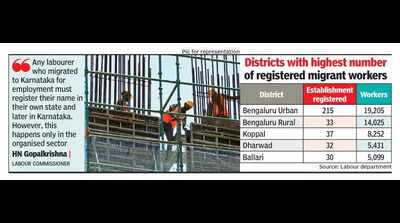Bengaluru: While trade unions estimate that Karnataka is home to over 20 lakh inter-state migrant workers , official records in the state labour department show just 79,653 are registered, with the majority concentrated in Bengaluru. This stark discrepancy has raised concerns among labour activists and officials, who are calling for immediate reforms to better track and protect workers across both organised and unorganised sectors. The issue gained renewed attention after a migrant worker was killed in an encounter in Hubballi, following his alleged involvement in the rape and murder of a five-year-old girl.
In the wake of the incident, home minister G Parameshwara announced that he would meet labour minister Santosh Lad to discuss the migrant worker issue and review the state's monitoring systems. Labour officials too have admitted they lack data on migrant workers in the unorganised sector, which accounts for a large portion of the workforce. Greater Bengaluru Development Authority (GBDA) chairman GN Nataraju expressed concerns over the growing number of migrants in Bengaluru mainly in areas like Bidadi, which houses over 10,000 of them.

Police should also draw up a mechanism to keep tabs on them," Nataraju said in a letter to local authorities. According to trade union leaders, the actual number of migrant workers in Karnataka could be far higher than the official count. "Lack of data on migrant labourers was a big challenge for the govt during Covid-19," said KV Bhat, state convenor of the Joint Committee of Trade Unions (JCTU).
He said there could be roughly over 20 lakh migrant workers in the state. "The Union govt asked the states after Covid-19 to constitute migrant workers' welfare boards. Karnataka will get the details of such workers if it constitutes the board and mandates the compulsory registration of migrant workers.
" S Varalakshmi, state president of the Centre of Indian Trade Unions (CITU), explained that employers often avoid registering migrant workers to escape providing mandatory facilities such as accommodation, medical care, and protection. While the labour department's figure of 79,653 registered migrant workers only accounts for those in the organised sector, officials acknowledge that the real number is likely much higher, especially when considering those in the unorganised sector. According to the e-Shram database, a national registry of unorganised workers, over one crore people in Karnataka are employed in sectors such as agriculture, construction, and domestic work, with a significant proportion being migrant labourers.
During the 2020 pandemic lockdowns, Bengaluru authorities sent over 2 lakh migrant workers back to their home states by train. Another 3 lakh workers left the city independently. It is estimated that Bengaluru urban and rural areas currently host nearly 10 lakh migrants.
A senior police officer, however, estimated that there could be around 5 lakh migrant workers in Bengaluru Urban. The state's reliance on the Inter-State Migrant Workmen Act, which mandates registration of workers in the organised sector, has led to a gap in the data. With Bengaluru and Bengaluru Rural districts becoming hotspots for both organised and unorganised migrant labour due to the booming construction sector, officials say most migrant workers are from Bihar, Jharkhand, Uttar Pradesh, Chhattisgarh, and West Bengal, with some coming from Tamil Nadu and Andhra Pradesh.
Migrant labourers from North East largely flock to the Malnad region, mainly the coffee-growing districts of Kodagu and Chikkamagaluru. A majority of migrant workers are also employed in the construction industry across the state. Naveen Kumar, a supplier of construction materials, explained how the labour supply chain works: "Building or civil work contractors approach thekedars (labour contractors) or munshis for workers.
They pay an advance amount ranging from Rs 50,000 to Rs 1 lakh to the family of the workers in their state and later bring them for work." These contractors, he added, avoid registration as they bring workers back only when needed. The labour department may soon start a registration drive in an effort to close the data gap and improve oversight of migrant workers across the state.
————— Quote Any labourer who migrated to Karnataka for employment must register their name in their own state and later in Karnataka. However, this happens only in the organised sector HN Gopalkrishna, labour commissioner —- GFX Districts with highest number of registered migrant workers District Establishment registered Workers Bengaluru Urban 215 19,205 Bengaluru Rural 33 14,025 Koppal 37 8,252 Dharwad 32 5,431 Ballari 30 5,099 Source: Labour department —-.















